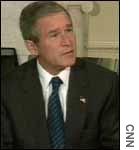|
Bush mulls fiscal tonic
|
 |
October 2, 2001: 11:32 a.m. ET
President, Congressional leaders try to find right stimulus package
|
NEW YORK (CNNfn) - President Bush and U.S. lawmakers met Tuesday to discuss ways to stimulate the world's largest economy in the wake of the worst terrorist attack in U.S. history.
Economists have worried that the U.S. economy, already suffering from a year-long slowdown, was pushed into a recession after Sept. 11, when terrorists flew into the World Trade Center towers and the Pentagon, killing thousands of people and causing billions of dollars in damage.
| |

|
|
President Bush talking to reporters Tuesday morning | |
Consumer spending, which fuels two-thirds of the economy, apparently withered after the attacks, and U.S. leaders have been looking for ways to strengthen it. Federal Reserve policy makers also met Tuesday to discuss the possibility of cutting short-term interest rates as another way to stimulate spending.
"The best way to stimulate demand is to give people some money so they can spend it," Bush said after his meeting with Congressional leaders Tuesday.
Bush and Congress must decide exactly how much money to give consumers, walking a fine line between giving too much and not giving enough.
"What's needed is a stimulus package big enough to get the economy moving in the short run but small enough so that it doesn't affect long-term interest rates," Bush said.
Already, Bush and Congress have approved a $40 billion emergency relief package and a $15 billion bailout of the airline industry. Together with a tax cut earlier this year and $40 billion in advance payments for 2001 tax credit -- commonly called "rebates" -- they have already pumped quite a bit of money into the economy.
Yields on 30-year Treasury bonds had been rising in the weeks since the attacks as investors became concerned that heavy government spending could lead to a pickup in inflation, and that, in turn, would erode the value of their long-term investments. But bond yields have moved back down in recent days, following statements by the likes of Fed Chairman Alan Greenspan, who warned Congress to be careful when considering new fiscal stimuli, saying it's better to be right than quick.
The Fed, on the other hand, has been aggressive with monetary policy, slashing short-term rates eight times this year to 3.0 percent. Most economists think the Fed will cut rates again Tuesday, bringing them below 3.0 percent for the first time in nearly 40 years.
Click here for more on the Fed and rates
Though the exact details of the Congressional stimulus package won't be known for some time, there are already hints about its size and scope.
Greenspan and former Treasury Secretary Robert Rubin told the Senate finance committee that the stimulus could be as large as one percent of GDP, or about $100 billion, a figure that includes the $55 billion already spent in the days following the attacks.
Glenn Hubbard, chairman of Bush's Council of Economic Advisers, told CNNfn Tuesday that all measures, including a controversial cut in the capital-gains tax, were "on the table" when Bush and Congress discussed possible stimuli.
But the package most likely to succeed will exclude a capital gains tax and include programs to satisfy both Republicans -- who want tax cuts for businesses and individuals -- and Democrats, who want more spending to help displaced workers.
Meanwhile, Democrats and Republicans on the House and Senate Budget committees informally agreed to project that the federal budget surplus for fiscal 2002 would be about $52 billion, meaning there's likely enough left in the budget for the additional economic stimulus Greenspan and Rubin contemplated.
Bush and Congress also reached an agreement Tuesday morning on additional spending for defense and education, clearing the way for Congress to pass various spending bills and economic stimuli by the end of the year.
At the beginning of 2001, the Congressional budget office projected a federal budget surplus of $400 billion through 2004, the result of a decade of spending discipline. Now, much of that will likely disappear.
"I think we'll be fortunate if a quarter of that materializes," said Henry Willmore, chief economist with Barclays Capital. "The change in the outlook for fiscal policy is remarkable." 
|
|
|
|
|
 |

|

